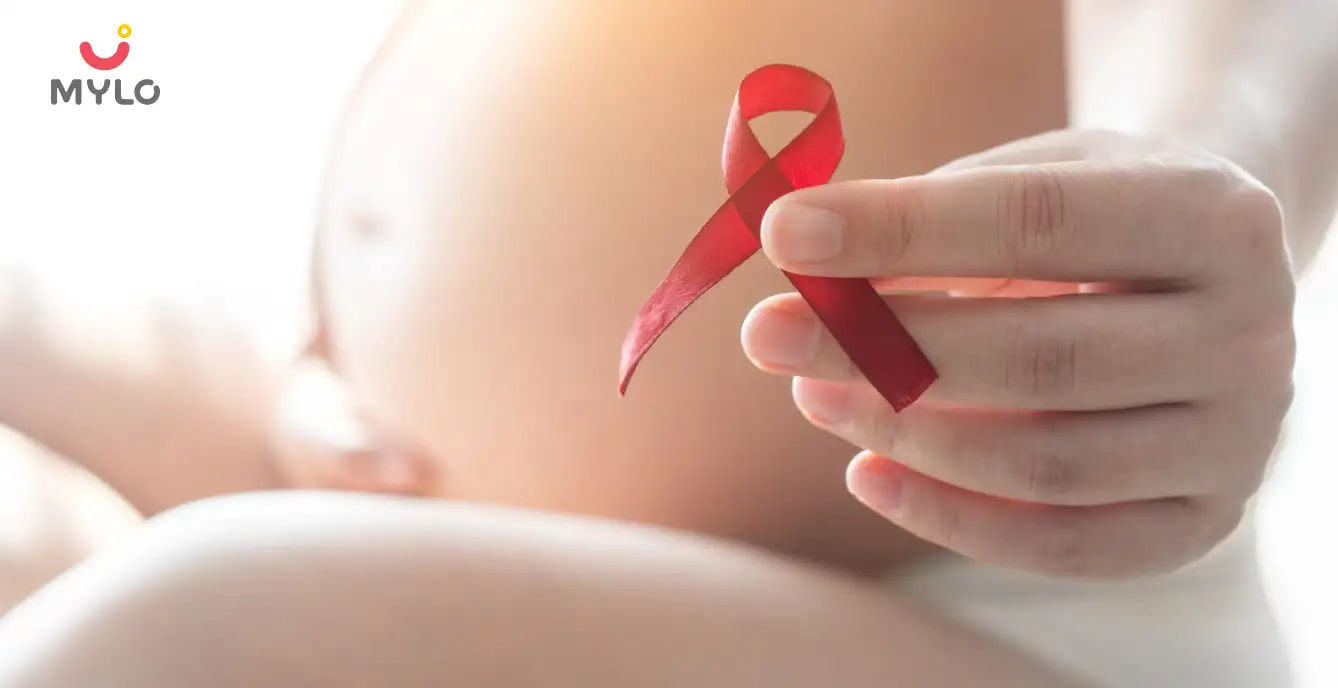Home

Symptoms & Illnesses

HIV in Pregnancy - Causes, Symptoms & Treatment
In this Article

Symptoms & Illnesses
HIV in Pregnancy - Causes, Symptoms & Treatment
Updated on 3 November 2023
Conception for women with HIV in pregnancy is the biggest worry! Can I deliver a healthy baby? Will harsh medication show adverse effects? Can I breastfeed like a regular mother? And the list of questions goes on. Although every question is a worthy concern, thankfully, you are not alone. According to the World Health Organisation, globally around 1.3 million HIV-positive women and girls become pregnant yearly.
In short, the chances of delivering a healthy baby depend on many factors, but because of modern medication, it’s now possible to reduce the chances of passing on the virus by almost 99 percent. Let us learn about the causes, symptoms & treatment of HIV in Pregnant Woman in details.
What is HIV in Pregnancy?
HIV (Human Immunodeficiency Virus) is a virus that attacks the immune system. HIV can be spread through sexual contact, sharing needles, drug injection equipment, or other body fluids.
The deadly disease can be transmitted by the mother and may lead to delivering an HIV-positive baby. However, taking medications and having regular check-ups with a healthcare provider can largely reduce the chances of transmission.
HIV/AIDS in pregnant women and infants
HIV Aids in Pregnancy is often misunderstood. In reality, HIV and AIDS are two different terms. Having HIV doesn’t mean you have AIDS. But without treatment, HIV can take a severe form of AIDS. Doctors conduct two separate tests to determine if you are infected with HIV or AIDS.
1. Viral load:
It shows the amount of virus you have in your body. Less virus load means fewer chances of transmission.
2. CD4 count:
White blood cells help your immune system fight infections. If your HIV is not treated, it will dissolve all your cells, making it harder for your body to fight diseases and leading to other health problems. HIV converts into AIDS if your CD4 count drops below 200 points.
Your ability to transfer the virus to infants mostly depends on these two factors. You might be living with a virus without any symptoms. That’s why every pregnant woman must undergo these tests in some countries like America.
Causes of HIV in pregnancy
You can contract HIV in pregnancy through unprotected sex or by sharing blood with an infected person.
HIV can be transmitted to the baby in three different ways.
1. During pregnancy:
The virus can be transferred from the mother's blood to the baby's blood through the placenta (a temporary organ that develops in the uterus during pregnancy to nourish the growing baby).
2. During childbirth:
There is a risk that the baby may come into contact with the virus during delivery. That’s why most doctors will suggest you go for a c-section.
3. During breastfeeding:
It can cause transmission, and you must be highly cautious even after a few months of birth.
Do pregnant HIV-positive women need to take their medications?
Yes, you must continue your medications as prescribed by the doctor. Antiretroviral medications are used to treat HIV infection and can help suppress the virus, reducing the risk of transmission to the baby.
Along with medication, please ensure that you receive regular medical care and attend all of your prenatal appointments. This can help ensure that potential complications are detected and addressed promptly.
Are HIV medications safe to take while pregnant?
Generally, it’s advised to refrain from taking heavy medication during pregnancy, but in the case of HIV, the benefits of taking medicines outweigh the potential risks.
These drugs help maintain both of your health and prevent the progression of HIV to AIDS. However, some medicines have the potential to cause side effects, but they can be eliminated with regular medical care and monitoring.
Symptoms of HIV during pregnancy
The virus can cause various symptoms, although some people with HIV in pregnancy may not experience any symptoms at all. It varies widely from person to person and may include
-
Fever
-
Fatigue
-
Rash
-
Swollen lymph nodes
-
Sore throat
-
Mouth ulcers
-
Headache
-
Nausea
-
Vomiting
-
Diarrhoea
-
Weight loss
-
Night sweats
If you are pregnant and experiencing these symptoms, please speak with your healthcare provider. HIV in pregnancy can be detected with the help of a blood test, and early treatment can help to reduce the risk of transmission to the baby. Also, it restricts the virus from spreading to its fatal stages.
You may like: Infections During Pregnancy That Can Harm Your Baby
Treatment of HIV in Pregnancy
To date, there is no known cure for HIV, but its severity can be detained with the help of the right medicines. Doctors majorly suggest three stages of treatment for HIV Infection in Pregnancy.
1. Medicines:
Doctors will likely suggest you take medicines during and even after pregnancy. These antiretroviral medicines help bring down your viral load, which ultimately restricts it from being transferred to your baby. The newborn baby may have to take medicine for a few weeks.
2. Type of delivery:
Vaginal delivery has potential risks of transmitting the virus, and in most cases, you will be recommended to go for cesarean (c-section) delivery. However, having a negligible viral load may increase your chances of vaginal delivery.
3. Breastfeeding:
The chances of virus transmission during breastfeeding are pretty rare, but doctors often recommend supplementing your baby’s diet with instant formulas for a safer side. Also, you will be recommended not to pre-chew your baby’s food.
If you have or contract HIV in pregnancy, it’s important to consult your doctor, attend regular prenatal checkups and follow all the necessary safety tips.



Written by
Roohi Kalra
Get baby's diet chart, and growth tips

Related Articles
Related Questions
Hello frnds..still no pain...doctor said head fix nhi hua hai..bt vagina me pain hai aur back pain bhi... anyone having same issues??

Kon kon c chije aisi hai jo pregnancy mei gas acidity jalan karti hain... Koi btayega plz bcz mujhe aksar khane ke baad hi samagh aata hai ki is chij se gas acidity jalan ho gyi hai. Please share your knowledge

I am 13 week pregnancy. Anyone having Storione-xt tablet. It better to have morning or night ???

Hlo to be moms....i hv a query...in my 9.5 wk i feel body joint pain like in ankle, knee, wrist, shoulder, toes....pain intensity is high...i cnt sleep....what should i do pls help....cn i cosult my doc.

Influenza and boostrix injection kisiko laga hai kya 8 month pregnancy me and q lagta hai ye plz reply me

RECENTLY PUBLISHED ARTICLES
our most recent articles

Diet & Nutrition
গর্ভাবস্থায় আলুবোখরা: উপকারিতা ও ঝুঁকি | Prunes During Pregnancy: Benefits & Risks in Bengali

Diet & Nutrition
গর্ভাবস্থায় হিং | ঝুঁকি, সুবিধা এবং অন্যান্য চিকিৎসা | Hing During Pregnancy | Risks, Benefits & Other Treatments in Bengali

Women Specific Issues
স্তনের উপর সাদা দাগ: লক্ষণ, কারণ এবং চিকিৎসা | White Spots on Nipple: Causes, Symptoms, and Treatments in Bengali

Diet & Nutrition
গর্ভাবস্থায় পোহা: উপকারিতা, ধরণ এবং রেসিপি | Poha During Pregnancy: Benefits, Types & Recipes in Bengali

Diet & Nutrition
গর্ভাবস্থায় মাছ: উপকারিতা এবং ঝুঁকি | Fish In Pregnancy: Benefits and Risks in Bengali

Diet & Nutrition
গর্ভাবস্থায় রেড ওয়াইন: পার্শ্ব প্রতিক্রিয়া এবং নির্দেশিকা | Red Wine During Pregnancy: Side Effects & Guidelines in Bengali
- ইনার থাই চ্যাফিং: কারণ, উপসর্গ এবং চিকিৎসা | Inner Thigh Chafing: Causes, Symptoms & Treatment in Bengali
- গর্ভাবস্থায় ব্রাউন রাইস: উপকারিতা ও সতর্কতা | Brown Rice During Pregnancy: Benefits & Precautions in Bengali
- Velamentous Cord Insertion - Precautions, Results & Safety
- Unlock the Secret to Flawless Skin: 7 Must-Have Qualities in a Face Serum
- Unlock the Secret to Radiant Skin: How Vitamin C Serum Can Transform Your Complexion
- Gender No Bar: 10 Reasons Why Everyone Needs a Body Lotion
- Unlock the Secret to Radiant Skin How to Choose the Perfect Body Lotion for Your Skin Type
- Top 10 Reasons to Apply a Body Lotion After Every Bath
- Communication in Toddlers: Milestones & Activities
- How to Improve Vocabulary for Toddlers?
- A Comprehensive Guide to Understanding Placenta Accreta
- Vulvovaginitis in Toddlers Causes, Symptoms and Treatment
- A Comprehensive Guide to Understanding Cerebral Palsy in Children
- Bitter Taste in Mouth During Pregnancy: Understanding the Causes and Remedies


AWARDS AND RECOGNITION

Mylo wins Forbes D2C Disruptor award

Mylo wins The Economic Times Promising Brands 2022
AS SEEN IN

- Mylo Care: Effective and science-backed personal care and wellness solutions for a joyful you.
- Mylo Baby: Science-backed, gentle and effective personal care & hygiene range for your little one.
- Mylo Community: Trusted and empathetic community of 10mn+ parents and experts.
Product Categories
baby carrier | baby soap | baby wipes | stretch marks cream | baby cream | baby shampoo | baby massage oil | baby hair oil | stretch marks oil | baby body wash | baby powder | baby lotion | diaper rash cream | newborn diapers | teether | baby kajal | baby diapers | cloth diapers | laundry detergent 6472 | lactomama lactation granules |




